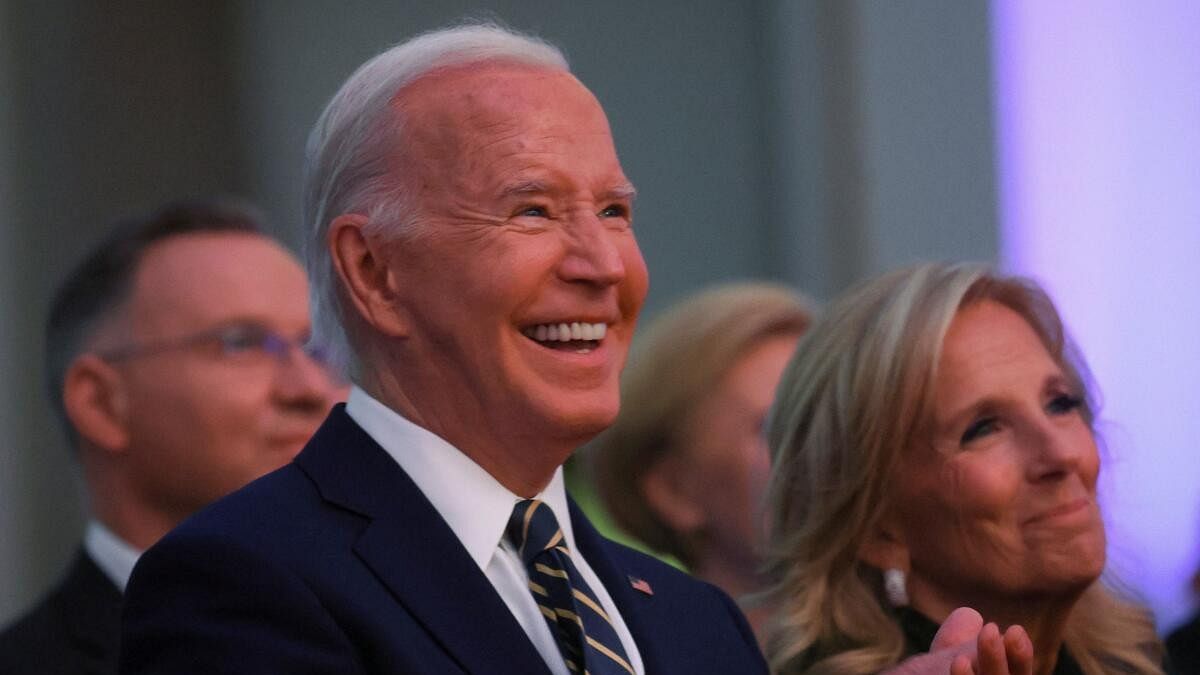
US President Joe Biden and US first lady Jill Biden.
Credit: Reuters Photo
By Mary Ellen Klas
As President Joe Biden continues to be almost as scarce on the campaign trail as his rival, attention is turning to the increasingly prominent role his wife is playing. First Lady Jill Biden has gone beyond the role of protector-in-chief. She’d better get used to the scrutiny and be prepared to answer some questions.
Jill Biden, 73, has long been her husband’s best defender — once even throwing herself in front of protesters as they lunged for the president on stage. With Biden’s visible physical decline and his resistance to calls that he drop out of the race following his disastrous debate performance, the first lady has become the most important person in the White House next to her husband. And America is watching.
“For all the talk about this race, Joe has made it clear that he’s all in,’’ the first lady proclaimed Monday in campaign appearances in Wilmington, North Carolina; Tampa, Florida; and Columbus, Georgia. “That’s the decision that he’s made and just as he has always supported my career, I am all in too.”
What does it mean for an unelected presidential spouse to be “all in”? She has become her husband’s ambulatory aid — helping him as he walked gingerly across the stage after the debate.
She’s become his awkward cheerleader. “Joe, you did such a good job,” she gushed, tapping her inner teacher at a post-debate party. “You answered every question. You knew all the facts.”
And she’s become his surrogate on the campaign trail. “We have to meet this moment as if our freedoms are at risk because they are,” she told audiences during appearances this week.
But is she planning to go beyond campaigner, cheerleader and crutch? Will she assume executive functions?
Americans have seen other first ladies thrust into protector roles that morphed into executive jobs. After Woodrow Wilson suffered a severe stroke in office, First Lady Edith Wilson screened all matters of state and, according to White House historians, was “functionally running the Executive Branch” for the remainder of his second term. She earned the nickname “secret president.”
Franklin D. Roosevelt had already been stricken with polio and confined to a wheelchair when he became president. His wife, Eleanor Roosevelt, traveled around the country and reported back to him about the living and working conditions she observed. She was affectionately called “the President’s eyes, ears and legs."
And for the aging Ronald Reagan, Nancy Reagan was his “enforcer,” according to former aide David Gergen, “fiercely protecting her husband’s energy and his image.” After Reagan was shot in an assassination attempt, Nancy Reagan helped “talk him into embracing the Brady Bill, a major gun control initiative much reviled by the right,” even though she had not previously taken a policy role.
Like Jill Biden, these first ladies were guardians and caretakers of their declining husbands. But times have changed. None of them faced today’s 24/7 news cycle, ubiquitous smartphones and a media ecosystem in which all politics are national. It’s a heavy load.
On Monday, as the first lady left a coffee shop between campaign appearances, a reporter yelled, “Do you have any message to House Democrats who are calling for your husband to drop out of the race?”
In a calm voice, Jill Biden turned around and answered, “Why are you screaming at me? You know me. Don't scream at me. Just let me talk.” She used exasperation to avoid answering the question. It was a veteran politician move.
A Washington Post photographer posted a video of the exchange, and Fox News wrote a story. The news value is in keeping the lens on the first lady, in subtle recognition of her newly elevated role. But other questions remain: Who is making the decisions? How often does your husband have these kinds of “bad nights” — the phrase Biden used to dismiss his poor debate performance. And will you be assuming more responsibilities?
As the political left grapples with the quagmire the Bidens have them in, the right has unsheathed its knives. Last week, the conservative American Spectator magazine scolded: “Jill Biden: The Enabler-in-Chief.”
“Protection of an impaired loved one and all in their path is the number one task of being a caregiver,” wrote the article’s author, Peter Rosenberger. “Caregiving is often heartbreaking. Enabling makes it even more painful.”
The use of the term enabler is a dramatic display of self-deception here. No Republican can watch the behavior of former President Donald Trump and condone it without considering themselves an enabler. But the broader point remains: If Jill Biden is “all in” for another four years, what’s her plan?
She’s not required to answer, of course. The first lady of the United States, FLOTUS, is a constitutionally undefined role. No founding document describes it, and it has been left to the people — to date, only women — who have held the position over the centuries to shape its traditions.
After her husband’s disastrous debate performance, Jill Biden made it clear she’s not shrinking from the role. She was the first to adopt the defiant tone that the president has also since projected. As the family gathered at the presidential retreat at Camp David after the debate, Jill Biden told Vogue that they “will not let those 90 minutes define the four years he’s been president. We will continue to fight.”
We get that they want to fight. But, given the uncertainties of the president’s health, Jill Biden owes it to Americans to tell us what victory looks like — for her.